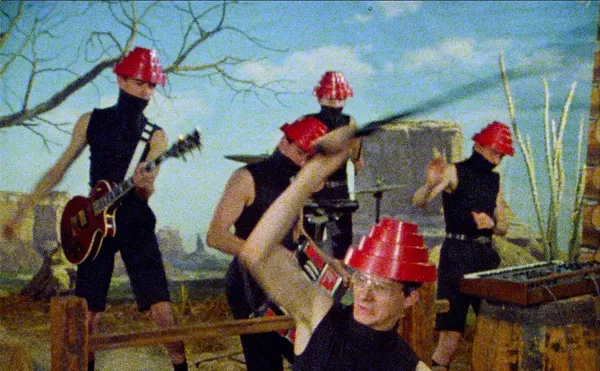The Motor City might not leap to mind as an excellent cycling town, but local advocates of “pedal power” not only say the city is well-suited to biking, but are doing their best to put more bicycles on the road.
In an age when one can find catalogs advertising electric go-karts next to stationary exercise bicycles without a whiff of irony, even knitting together the disconnect between fitness and cycling can seem daunting. But that isn’t stopping Detroit cyclists from extolling the bike for convenient transportation — not just health and recreation.
In a car-culture city known for single-home ownership, broad-brush zoning and local density lightened by way of the bulldozer, Detroit is largely caught in the middle — not a walking town and yet not an easy parking town either. Detroit’s roadways were all built to accommodate traffic that has tapered off with depopulation; so wherever you need to cycle, you can find a route with minimal competition from the automobile. As fair weather returns, it’s good to remember what we always knew: Biking is cheap, easy, healthful and fun.
Last year poet and performer Mick Vranich rebuilt a salvaged bike, a labor of love that snowballed into a cottage business he calls Coyote Bicycle. In less than a year, he has put dozens of bicycles on the road. Putting the finishing touches on a canary Peugeot in his basement workshop, Vranich’s obsession with the metaphysical creeps in as he relates, “They’re sort of like ponies. They’re wounded — they’re disregarded. Because each bike has a spirit. Every one has all these marks.”
Pointing to a scuffed frame, he explains, “See, I don’t paint any of them. I like this. This is all part of the history of what happened.”
This philosophical fascination doesn’t overwhelm the practical admiration of a tinkerer when he declares, “They’re such beautiful machines. They’re so perfect. … It’s such an amazing transference of human energy into mobility.”
Vranich also sees the bicycle as a means to opt out of conspicuous consumption in a small but meaningful way.
“I like the idea of reuse, no pun intended, but ‘recycling,’ right? The fact that there’s so much refuse in America, and here’s just one little niche: bicycles. It’s already been made — it’s already gone through that process, so, in terms of pollution, it’s a pretty clean start.”
Vranich’s great joy is sharing that passion with others.
“You sell a bicycle; people leave smiling; they’re so happy. Bicycles are so basic. … I love that process.”
Though Coyote Bicycles relies purposely on word of mouth, with a few unannounced street sales in front of the Avalon Bakery on Willis in Detroit, Vranich does plan to have a bicycle sale this June at the Alley Culture art space. He can be reached, via voice mail, at 313-930-8116.
Another place where would-be cyclists can get some wheels — and get some grease under their nails — is Back Alley Bikes, an outgrowth of the Detroit Summer project (3611 Cass, just north of Martin Luther King Jr. Blvd. — 313-832-2904). Saturday and Tuesday afternoons, the grassroots program offers inner-city Detroiters, mostly youths, the opportunity to build their own bicycles out of whatever parts are available. Those who complete a safe bicycle can ride it out the door.
Volunteer Pat Flinn, a soft-spoken retiree, says, “We maybe get 10 percent of the kids coming in with an actual bike of their own. For the most part, they don’t even have a bike.”
Yet, before Flinn is done discussing the youngsters who come in and learn how to build bicycles, he is busy helping an adult, who must quickly bike to work, fix his ride.
Flinn says many who come through the door “are adults that have no method of transportation, so we try to do the best we can for them. This is not just a plaything or a toy for them — it’s their own personal transportation.”
While Flinn takes pride in what Back Alley Bikes is able to accomplish, he admits that they lack the resources to train their aspiring cyclists to ride.
One group that works to help riders take to the road is Critical Mass, a non-hierarchical group of cyclists which meets the last Friday of each month at 5:30 p.m. in Grand Circus Park. Described as a “free, non-athletic bike ride through streets normally considered to be bike-unfriendly,” the Mass engages in what some call “vehicular cycling,” obeying all the traffic rules as any vehicle should, and thereby traveling with greater speed and safety. Get more information on urban cycling at m-bike.org.
Todd Scott, 39, the executive director of the Michigan Mountain Biking Association (www.mmba.org), bikes with the group and characterizes it as “recreational with the dream of being more activist and educational.” Scott hopes that group rides like Critical Mass challenge the distinction between sport cycling and non-athletic biking, remarking, “For some, sport cycling is about fitness or racing, but even Lance Armstrong rides his bike to the coffee shop.”
Whatever fun and camaraderie Critical Mass produces, such rides nationwide have actually encountered hostility from motorists and law enforcement. When charged by horn-pounding drivers with obstructing traffic, Critical Mass riders sensibly and genially counter, “We are traffic.” According to Scott, “Cycling has a major inferiority image among many road planners and government officials — even those with good intentions,” and points out that, “metro Detroit’s rapid rate of sprawl is making cycling less viable. However, I don’t see Detroit’s problems being that unique. We’re just further behind other more cycling-friendly communities such as Portland or Washington, D.C.”
Scott also adds that “Detroit and the first-ring suburbs are great places to ride. The problem is cycling advocacy in Michigan has for the most part been asleep for decades. It’s been busy concentrating on organized tours. It’s starting to change, but there’s a long ways to go.”
Take me back to the index of Metro Times' Summer '03 Guide. Michael Jackman is a Detroit-based freelance writer. E-mail [email protected]






